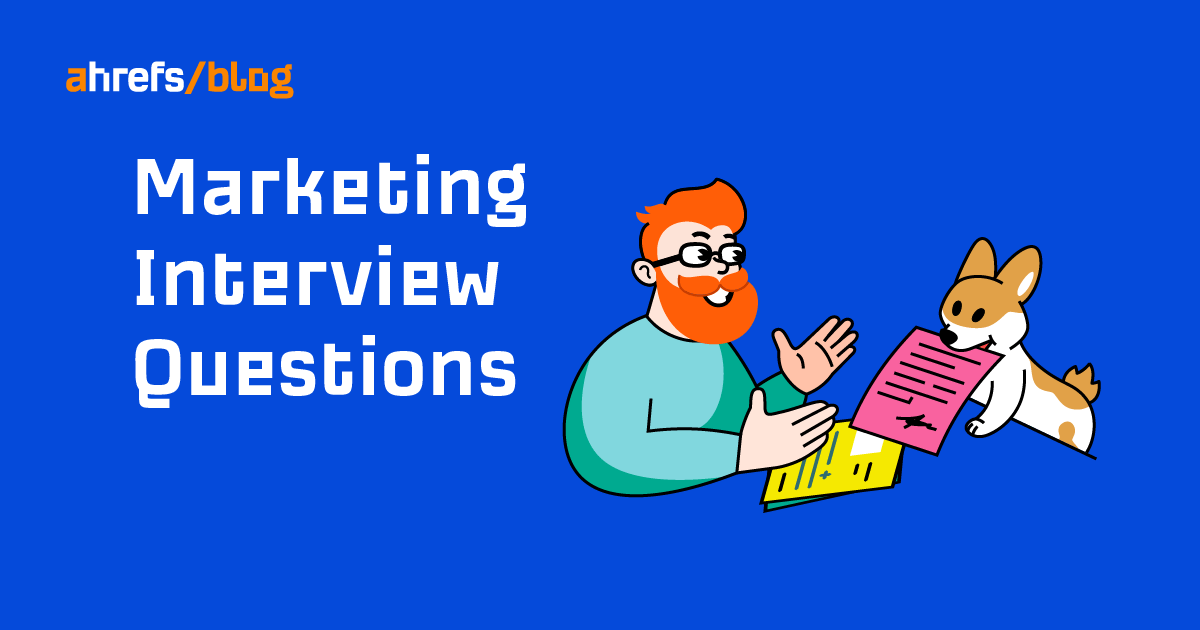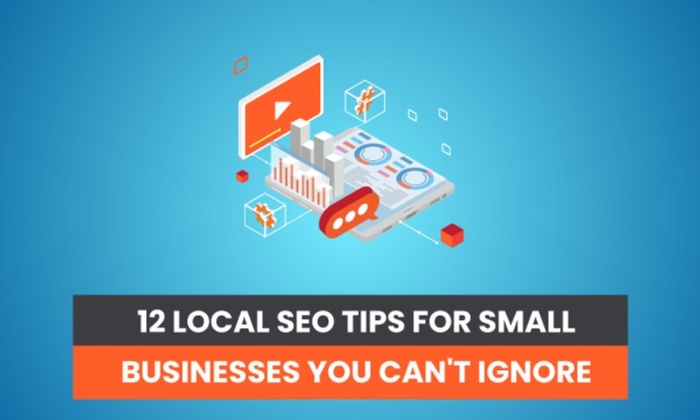LinkedIn Ads: A Complete Guide For Beginners via @sejournal, @ashleymadhatter
When it comes to B2B marketing, there’s nothing quite like LinkedIn Ads. Here’s everything you need to know to get started with them. The post LinkedIn Ads: A Complete Guide For Beginners appeared first on Search Engine Journal.

Designed to facilitate professional connections, LinkedIn Ads can be one of the best platforms in your marketing arsenal – if you know how to use it.
Why should you advertise on LinkedIn? The platform boasts 850+ million members, with 40% of visitors engaging with a page every week. Check out this article for more data from LinkedIn, including paid engagement stats.
Ready to get learn how to advertise on LinkedIn? Let’s go.
LinkedIn Advertising Options: An Overview
LinkedIn used to be extremely limited with its advertising options, which didn’t give marketers many options for achieving their goals.
But that has changed. LinkedIn appears committed to providing advertisers with the freedom they need to create ads based on their specific objectives, namely one of the following:
Brand awareness. Website visits. Engagement. Video views. Lead generation. Website conversions. Job applicants.The most commonly used objectives with LinkedIn advertising are lead generation, job applications, video views, and website visits, but you can successfully use the platform for any of these.
Why Advertise On LinkedIn?
Billing itself as “the world’s largest professional network,” LinkedIn has more than 875 million members in more than 200 countries and territories.
And, as the only social platform focused solely on business-to-business connections, it’s the ideal place for B2B marketing.
No matter what industry you’re targeting, you’re going to find the majority of the major players on LinkedIn.
Even more importantly, LinkedIn is a platform where you’re most likely to find the actual decision-makers you’re looking for. Need to identify the C-suite executives of a manufacturing firm? LinkedIn is the place to look.
Trying to go after mortgage brokers at small- to mid-sized firms? LinkedIn lets you do that.
Hiring for a new sales role and want only candidates with 5+ years of experience? You guessed it, LinkedIn is the place to search.
According to the platform’s own research, 80% of LinkedIn members influence their organization’s buying decisions, they have twice the buying power of an average web audience, and they are a whopping SIX times more likely to convert.
So again, if you’re not using them already, you need to get on the LinkedIn Ads train right away.
How Do LinkedIn Ads Work?
Using LinkedIn Ads is a fairly easy process, particularly if you have experience in pay-per-click (PPC) advertising already.
To get started, sign up for LinkedIn Business Manager. This gives you a single place from which you can manage all your ad accounts and pages.
In this step, you can invite team members and partners, set permissions, and add assets.
From there, you just need to choose an objective (awareness, consideration, or conversions), choose your targeting options (location, attributes, etc.), pick your ad’s format, and set your budget.
Types Of LinkedIn Ads
Based on the objective you choose, you’ll be given four different ad types you can use:
Sponsored Content
Think of this as a promoted post. You’re promoting an article or post from your company page that appears in the LinkedIn feed.
 Screenshot from LinkedIn, January 2023
Screenshot from LinkedIn, January 2023
These ads do have the highest CPC on average, so proceed with caution and make sure the content you’re promoting is well thought out.
Text Ads
These are the tiny little ads you may or may not notice on the right side rail of a LinkedIn feed. Think Facebook Ads circa 2010.
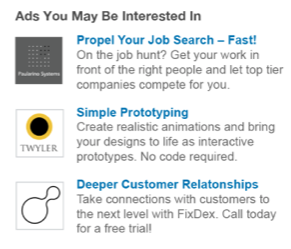 Screenshot from LinkedIn, January 2023
Screenshot from LinkedIn, January 2023
Aside from the right column, these ads may appear underneath the “People You May Know” section. This is where text content can really make or break your ad conversions.
Test a few different strategies but really get to the point with these ads.
Sponsored InMail
This is a super fun way to spam someone’s LinkedIn inbox. But, when done properly, it can actually convert higher than any of the other LinkedIn ad options.
Because these ads need to come from a personal profile versus a branded business page, people feel less like they are being sold and more as they can actually communicate with a representative of the business.
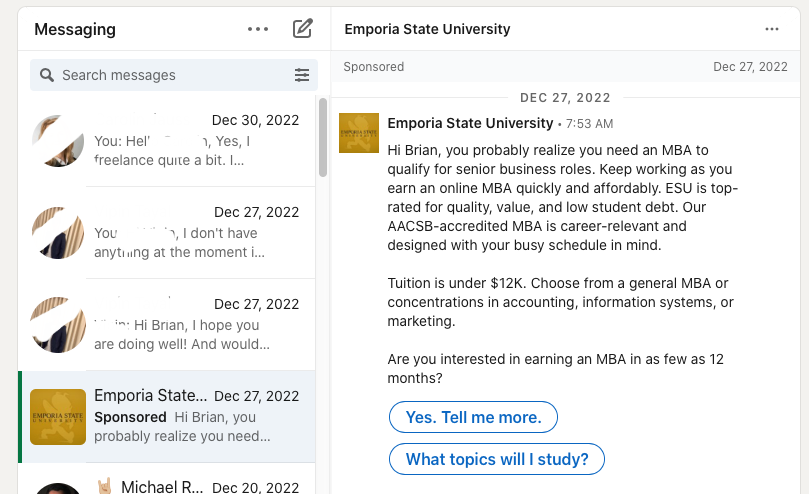 Screenshot from LinkedIn, January 2023
Screenshot from LinkedIn, January 2023
Just please don’t copy and paste templates to any of your demographics. Make sure and make each InMail personal.
Video Ads
A bit self-explanatory here, but LinkedIn’s video ads help promote your videos to your ideal target market. You should be creating a ton of video content.
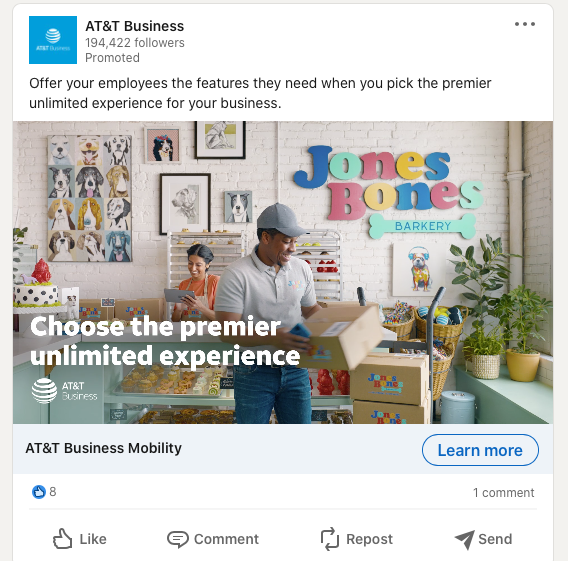 Screenshot from LinkedIn, January 2023
Screenshot from LinkedIn, January 2023
Test various videos to see which type of video (topic, length, real life/animation) gives you the most conversions.
Need help with the ad dimensions and specs? Here’s all of the info you’ll need for each ad type and objective as you begin creating ads for LinkedIn:
Advertising Guidelines. Advertising Specifications for Dynamic Ads. Advertising Specifications for Sponsored Content. Advertising Specifications for Sponsored InMail. Advertising Specifications for Dynamic Job Ads for Talent Media. Advertising Specifications for Text Ads. Advertising Specifications for LinkedIn Display Ads.How To Track LinkedIn Ad Conversions
Site-Wide Insight Tag
This tag gives you the 411 on what actions are happening on your website, thanks to your LinkedIn ad.
Like the Facebook pixel, you can install this tag once and watch the data come in.
It won’t mess up the speed of your site either, but it will allow you to track what’s happening on your website as a result of your LinkedIn ad.
BONUS: You can also set up LinkedIn retargeting ads once you have the Insight tag installed and a steady amount of site visitors.
Event-Specific Pixel
This type of tracking pixel is created more for the lead-gen type of objective.
Say you have a form you want someone to fill out from your LinkedIn ad, but you don’t have a thank you page set up or connected.
You can install this code and still have a “conversion event” tracked each time the form is completed.
You can also add conversion tracking to existing campaigns – so fear not those who haven’t set up conversion tracking.
LinkedIn Ads Best Practices
Now that you know how you can use LinkedIn Ads, let’s dive into the nuts and bolts of how you should be using LinkedIn and discuss some best practices to help you get the best results.
Pinpoint Your Target Audience
To help you identify and go after the targets who are most likely to act, you need to ask some questions like:
Who is your demographic, more than just male/female, age/location? Have they worked in the same industry their whole lives? Are they generally lower management or upper management? Do they hold onto their job for two to four years for each position? Do they follow Richard Branson on LinkedIn?You should already know the answers to all these questions, and if, for some terrible reason, you don’t, find out the answers.
LinkedIn gives B2B marketers amazing targeting options, but it can only help your ads convert if you truly know the professional side of your demographic.
Knowing how they take their coffee is great for Facebook, but on LinkedIn today, you need to know what they studied in college, if they even went to college, and select those relevant factors as targeting options.
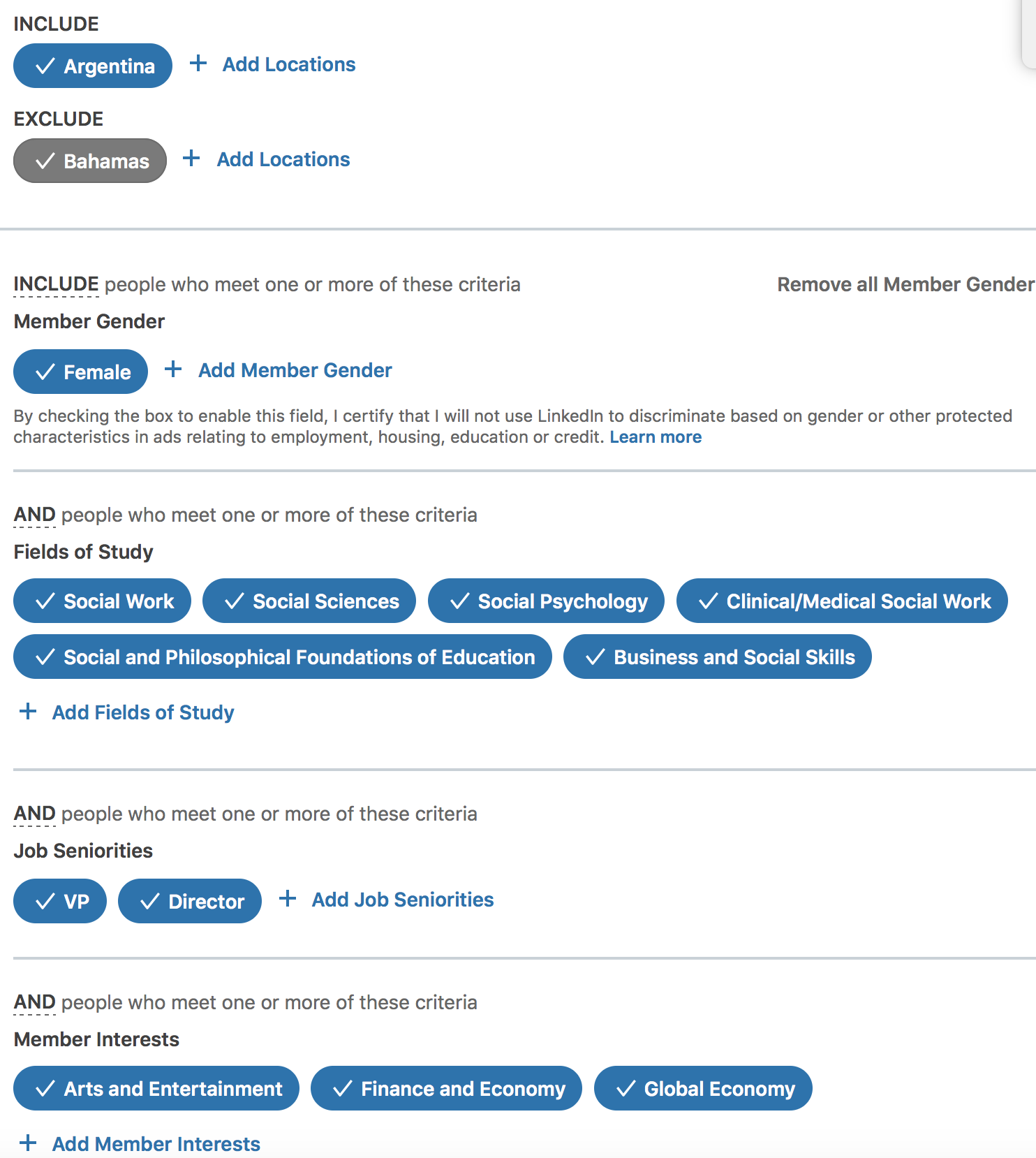
Note: You can attract a whole lot more than just CEOs with advertising on LinkedIn. Many businesses assume LinkedIn ad targeting is only great for targeting the big player, but it isn’t.
Those looking for jobs or in lower-level positions with less experience, even those who just graduated from high school or college, are perfect targeting options for LinkedIn ads.
Use LinkedIn’s Content Suggestions
LinkedIn offers Content Suggestions for business pages to help guide them on what they should write about.
Think outside of the box on this one and use trending topic ideas for ad headlines and descriptions.
The Content Suggestions are super easy to use, and you can even target those directors and CEOs you’ve been eyeballing.
Simply choose the industry, location, and seniority you’re targeting, and LinkedIn will generate the latest trending topics for those designated filters.
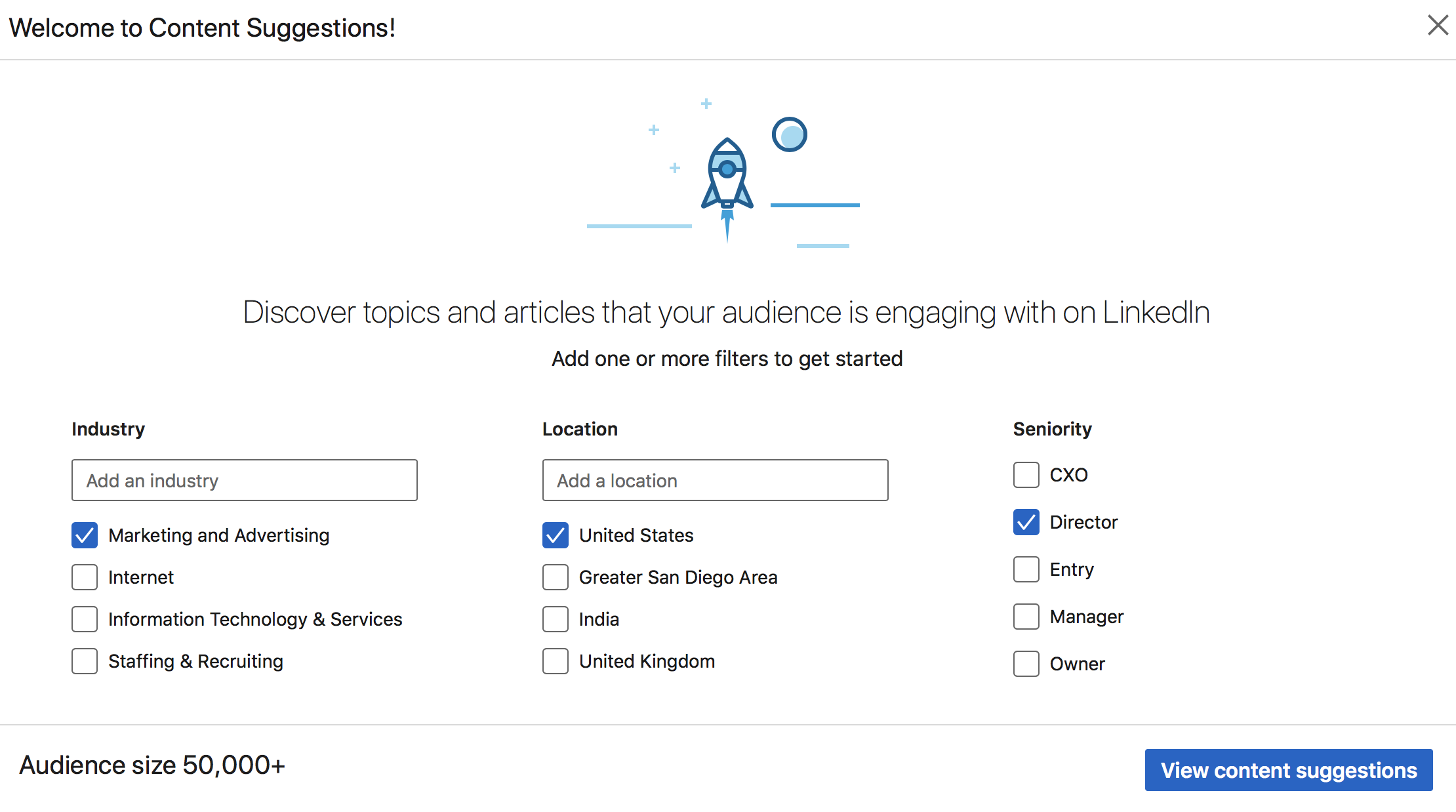
Results in:
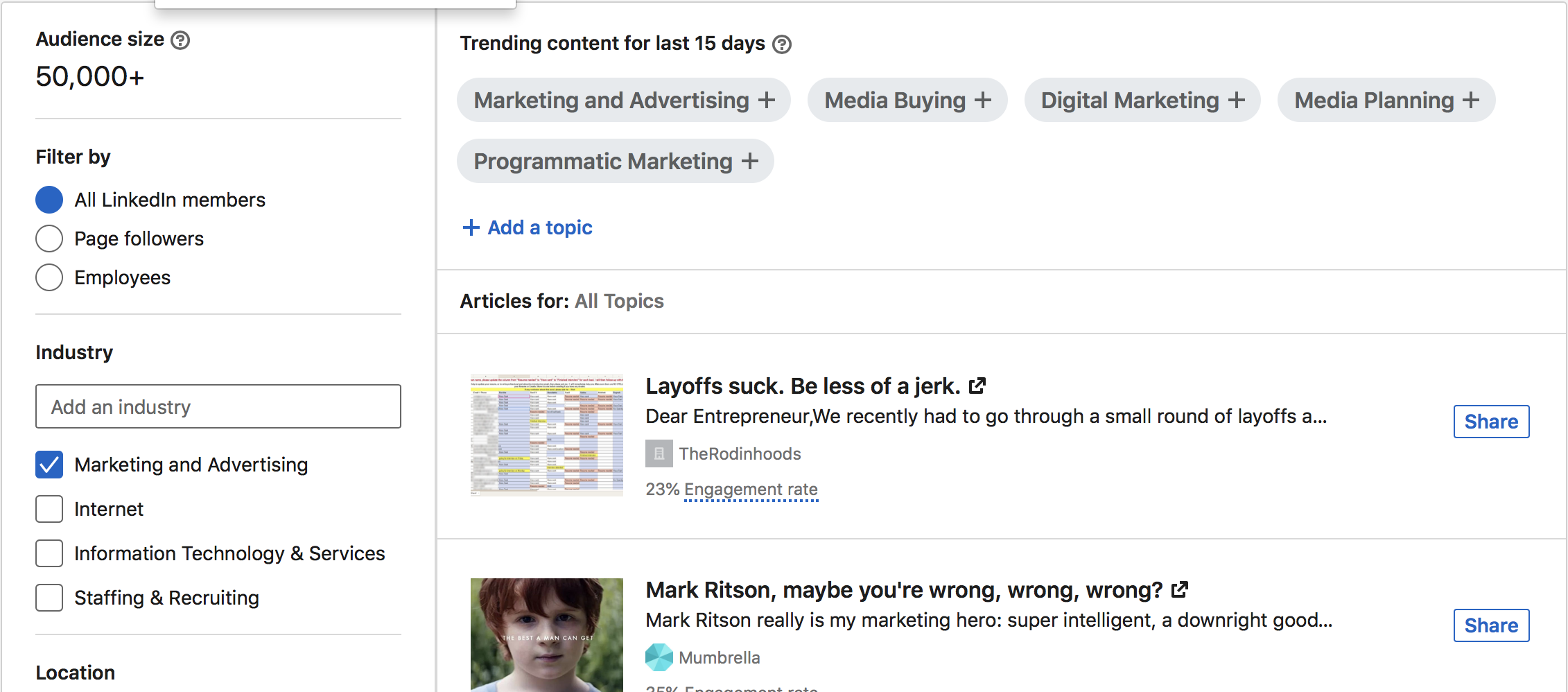
If we even take just the first article that populated in this test search, “Layoffs suck. Be less of a jerk,” we can easily snag a few different ad headline ideas:
Sick of dealing with layoffs? So Were We Until We Tried This. Done Being the Jerk? Over Laying People Off? Click Here. What We Found From Layoffs – Click HereIf an article is trending, it’s because people have liked it and engaged with it.
Don’t you want those same people to like and engage with your ad, too? Of course, you do.
Create Lead Gen Forms
One of the best reasons to use LinkedIn Ads is that it allows you to generate high-quality leads with proven return on investment (ROI).
And the best way to do that is by using the platform’s built-in Lead Gen Forms.
Available for both message ads and sponsored content, they’re easy to set up and can be directed to just by adding a call to action (CTA) to your ad. Once a user clicks on the ad, they’ll see a pre-filled form that already includes their name and relevant info.
Submitting the form, LinkedIn members can be directed to specific “Thank You!” pages that connect to your website, ebook download site, or any other destination.
And because marketers love numbers, Lead Gen Forms make it really simple to measure the impact of campaigns.
Via either your Campaign Manager or the third-party platform of your choice, you can generate reports on important metrics like cost per lead, form fill rate, and audience information.
If You’re In B2B, You Should Be Using LinkedIn Ads
For professional or business-to-business marketing, there really is nothing quite like LinkedIn.
By offering the flexibility you want in social media advertising, combined with a good ROI, it can help you reach decision-makers like never before.
But, like most things marketing-related, you can’t expect miracles to happen overnight. It will likely take some experimentation and fine-tuning before you settle on the best approach for your organization’s needs.
Just have some patience and a clear strategy, and you’ll have this powerful social platform reaping the rewards for you before you know it.
Featured Image: ZacoDot/Shutterstock

 ValVades
ValVades 









